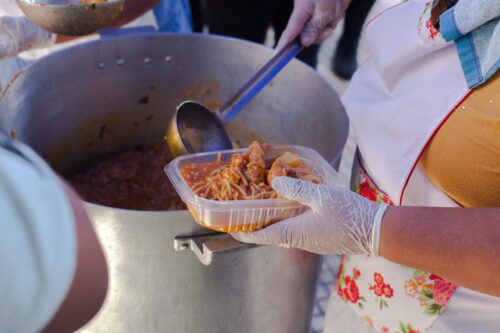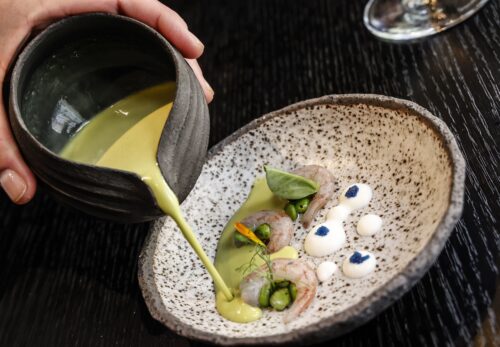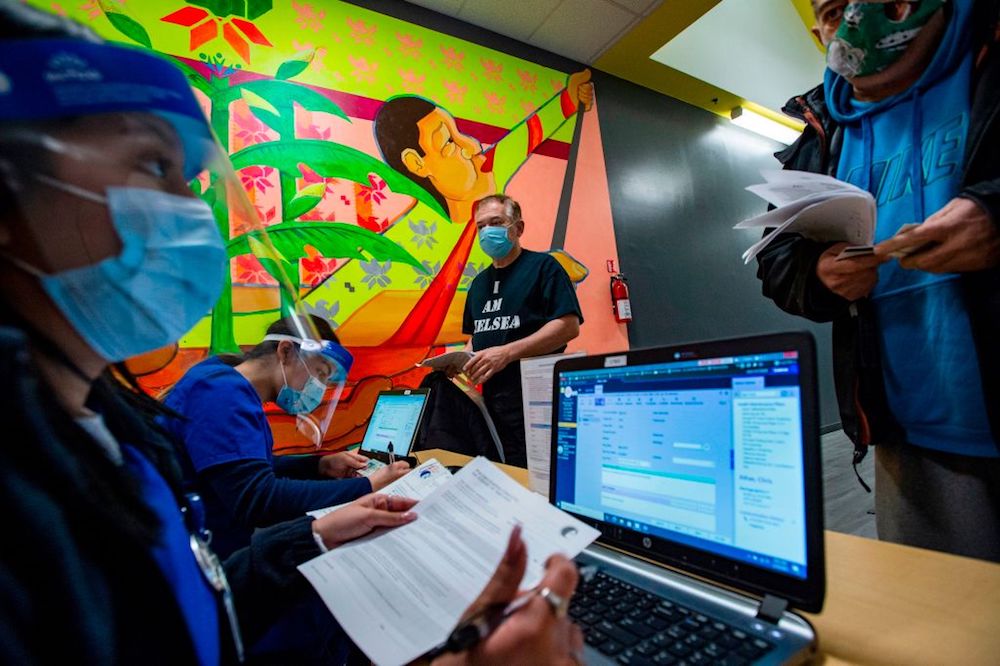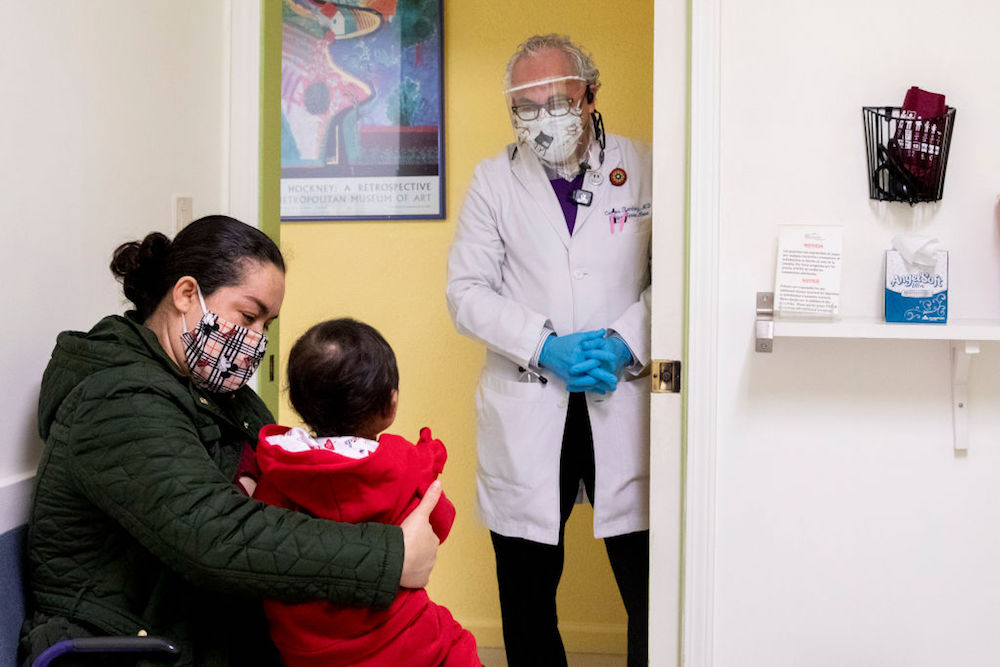What Is Vaccination Equity?
Born in Mexico, Rosario (a pseudonym) has worked as a cleaner in the Los Angeles public hospital system for more than three decades. But despite meeting California state guidelines that would prioritize her receiving a COVID-19 vaccine—as both a health care worker (meeting Phase 1a guidelines) and a person over 65 (Phase 1b guidelines)—she still hasn’t received one.
Her children have made her aware of the mass vaccination sites within driving distance from her home, such as Dodger Stadium. She has both a driver’s license to prove her age and a hospital ID badge to prove her health care worker status—but, as an undocumented person, she worries that her lack of legal U.S. citizenship status might be used against her.
“I’d rather not take the risk,” she explained to me. “I wear my mask. I stay away from people at work. I try my best to keep myself safe.”
As her son put it, “My mom doesn’t want to get sick, but to her, there is nothing worse than the risk of being deported.”
As an anthropologist who focuses on human rights and, specifically, on the rights of immigrants, refugees, and other stateless or displaced populations, it’s not the first time I’ve heard about the risk of deportation outweighing other risks. Due to a fear of deportation among undocumented populations in the U.S., crimes commonly go unreported, illnesses go untreated, and critical life events, such as weddings and funerals, go unattended. Nonetheless, I was devastated to hear this sentiment time and again when interviewing frontline workers for this post.
We in the U.S. must face the fact that we’ve created a system where even some on the frontlines of the pandemic who keep our hospital rooms clean and the sickest among us safe harbor fears greater than contracting COVID-19.
Public health advocates argue that a substantial percentage of the population must get vaccinated to achieve herd immunity—or community protection. At this point, we don’t know what percentage that is for COVID-19.
We do know that community protection will require immigrants, both documented and undocumented, and refugees to be included in vaccination plans and made to feel secure when accessing vaccines.
Many in these populations live in lower-income communities, where multiple generations are packed into shared living spaces, and work in essential industries, including health care, agriculture, meatpacking, and food prep and delivery.
In other parts of the world, there’s a wide spectrum of who gets included in national vaccination plans. Countries such as Jordan and Germany, for instance, were among the first to publicly include refugees in their vaccination plans, while Colombia was one of the first to publicly exclude refugees and undocumented immigrants from vaccination. These discrepancies reveal the need for vaccination equity, or more systematic and humane approaches to vaccination that include the most vulnerable people around the world.
Under the new Biden administration in the U.S., the biggest challenge may not be pushing the government to make vaccines available to immigrant and refugee populations, but pushing against the deep governmental distrust that has already been sown in these communities.
We know that immigrant and refugee communities, along with Latinx, Black, and Indigenous communities, have been hardest hit by the pandemic. As COVID-19 continues to rage through minority communities across the U.S., it has laid bare the consequences of centuries of discrimination in housing, health care, and employment. As a result of these inequities, many of those working in frontline jobs are also more likely to be dealing with ongoing economic insecurity and preexisting health conditions, putting them further at risk of spreading and contracting COVID-19.
In addition, the Trump administration’s brutal immigration policies have left many immigrants with an understandable distrust of the government and any governmental programs that may or may not be extended to them. How is this fear, combined with concerns over legal status, language barriers, and access to transportation, technology, and health care, impacting even those like Rosario who meet the local qualifications for vaccination?
President Joe Biden said in a statement on February 1 that undocumented immigrants should have access to vaccines, adding that federal authorities would not be allowed to conduct immigration enforcement operations at vaccine distribution sites. A statement released by the Department of Homeland Security on the same day further supported this call for equal access: “It is a moral and public health imperative to ensure that all individuals residing in the United States have access to the vaccine.”
This marks a dramatic shift from DHS messaging about immigrant rights under the Trump administration and the first time the department has publicly addressed the intersection of immigration enforcement and national vaccination plans.
But state by state, the policies differ. Florida, for instance, recently issued new residency rules in an attempt to fight against what the state government is calling the threat of “vaccine tourism.” Gov. Ron DeSantis said in mid-January, “We’re only doing [shots] for Florida residents.”
Intended or unintended, policies like these will exclude all those who lack legal documentation, which will have detrimental effects on the state’s large immigrant population and, arguably, detrimental effects on the population as a whole. In a state where 1 in 5 residents is foreign-born and an estimated 4 percent of the entire state population is undocumented, a vaccination plan that runs counter to the DHS’ call for equal access will make it all but impossible to ever win the battle against COVID-19.
Like the U.S., other countries with substantial populations of foreign-born residents are beginning to recognize the necessity of expanding vaccination plans to account for those who lack any formal documentation or whose only documentation may be through the United Nations refugee agency (UNHCR). These efforts are especially crucial for countries that host large refugee populations who live in close quarters.
The UNHCR, the international organization tasked with protecting the rights of those who have been forced to flee their homes by war, violence, or persecution, estimates the global number of forcibly displaced people to be at its highest point in human history: 79.5 million. Over half of the world’s refugees (nearly 26 million) are under the age of 18. Sixty-eight percent of those recognized by the UNHCR come from just five countries—Syria, Venezuela, Afghanistan, South Sudan, and Myanmar—and 85 percent are being hosted by lower-income countries.
Shockingly, these high numbers don’t account for the tens of millions who are being driven from their homes by the catastrophic effects of climate change and economic need every year.
We must face the fact that we’ve created a system where even some on the frontlines of the pandemic harbor fears greater than contracting COVID-19.
Jordan, which hosts one of the world’s largest populations of refugees, drew international attention for also being one of the first countries to publicly include refugees in its national vaccination plan. Jordan hosts more than 1.3 million displaced Syrians (including 660,000 U.N.-recognized Syrian refugees), plus tens of thousands of others who have fled conflict in Iraq, Lebanon, Palestine, Somalia, Sudan, and Yemen. With refugees making up more than 10 percent of Jordan’s population, a failure to include them in national public health plans would mean an even longer and deadlier fight to contain the country’s outbreak of COVID-19.
The United Nations plans to play an active role in distributing vaccines to the tens of thousands living in refugee camps in Jordan. However, distribution is likely to remain a challenge for the majority of the country’s unofficial refugees who live in sprawling impoverished areas that surround major cities such as Amman and Zarqa.
Host countries like Jordan and the U.S. are mandated by international law to provide a number of basic social services to refugees, ranging from education to health care. But some citizens staunchly oppose this mandate and demand that their health needs be prioritized over those of their refugee neighbors. The UNHCR reports that of the 133 host countries it has information on, only 54 have publicly included refugees, asylum-seekers, and stateless populations in their vaccination plans.
While many host countries have been ambiguous about which populations will be prioritized in vaccine rollouts, others have taken a hard line. Colombia was one of the first to state outright that the 1.7 million Venezuelans who live within the country’s borders (45 percent of whom are U.N.-recognized refugees) would be denied access to vaccines. After some pushback, the Colombian government is considering revising their approach, but vaccine access for Venezuelan refugees in the country remains uncertain.
In comparison to some other countries, the U.S. accepts a low number of refugees—only 11,814 were admitted in fiscal year 2020—and has no official refugee camps. Despite these limitations, the U.S. remains a top destination for immigrants and asylum-seekers.
Those who were detained in one of the more than 200 jails run by U.S. Immigration and Customs Enforcement (ICE) over the past year were routinely denied their basic human right to health care. As the rates of COVID-19 infection and death have steadily grown behind bars, ICE detention centers have served as an egregious example of how immigrants and asylum-seekers are treated in the U.S.
But in the absence of governmental assistance, there have been community heroes stepping up to the frontline. Dr. Heval Kelli, who introduces himself as a Syrian Kurdish refugee and dishwasher-turned-cardiologist, is one of those heroes.
“Medicine should always go beyond the exam room,” the doctor, who now lives in Atlanta, Georgia, explained to me. “We shouldn’t just be treating patients in clinic. We should go beyond and advocate for the people who need it.”
Kelli has taken it upon himself to inform, protect, and advocate for his community. When he isn’t providing lifesaving medical care at the Northside Hospital Cardiovascular Institute, Kelli donates his time at a community health center in the heavily immigrant- and refugee-populated neighborhood of Clarkston, Georgia.
Intervention at this level could be the turning point for frontline heroes like Rosario—and the dozens of other undocumented health care workers who told me about their fear of deportation when we discussed vaccination. But this responsibility to ensure vaccination equity shouldn’t fall on the shoulders of individuals. If leaders hope to put an end to this devastating pandemic, it’s time for governments to recognize the critical need to protect all residents, regardless of citizenship status.



























